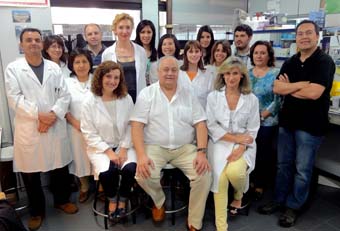
The journal “Lancet Infectious Diseases” (http://www.thelancet.com/journals/laninf/) includes an article about the current epidemic of ‘Schistosomiasis’ or ‘Bilharzia’ in Europe, its complexity, implications and potential consequences before the unexpected fact of being a situation of zoonotic nature. The article is coordinated by professor Santiago Mas-Coma, expert of WHO an director of the WHO collaborating centres and FAO/United Nations affiliated to Universitat de València.
In the text also participates professor María Dolores Bargues, member of the same centre and specialist in vectors of this parasitic diseases.
Professor Mas-Coma is currently the general coordinator of the Rapid Response to Parasitic Diseases Threats Committee of the European Federation of Parasitologists (EFP), and, consequently, is the person in charge of creating and organising the European network of specialised centres and with competences on this diseases, including the ministries of health of the corresponding European countries at risk situation. Besides, all of this is being carried out in collaboration with the WHO Central Headquarters in Geneva and the ECDC of Stockholm.
This parasitic disease, caused by up to seven species of trematode helminths of the genre ‘Schistosoma’, occupies the second place in global importance after malaria, affects nowadays over 200 million of people in Africa, Asia, and Latin America, and has a big impact on the development of societies in the developing countries due to their big morbidity, specially in children, and its relation with urinary bladder carcinogenesis in chronical infections by ‘Schistosoma haematobium’ that causes urogenital ‘Schistosomiasis’.
It is a priority for the World Health Organization (WHO). Each year are destined enormous quantities of millions of dollars to the fight and control of this disease, that needs the presence of freshwater snails of the family of Planorbids for its transmission. The need of appropriate temperatures for the larval development of the parasite has always been essential to impede the expansion of this disease from Africa to Europe, even though in the south of our continent, and concretely, in Portugal, Spain, France and Italy there are the snail species capable of transmit it.
The article has been written in collaboration with University of Perpignan and the Liverpool School of Tropical Medicine, and analyses the origin of the epidemic of urogenital ‘Schistosomiasis’ in the island of Corsica in 2011, its prolongation until today and the inherent risks. An average of 2,7 millions tourists visit the island, population 310.000, each year during the appropriate season from May to September. The article focuses on the importance of the climate change impact, including the global warming, and the global change, in this case specially the immigration and tourism; on the future risk of introductions or re-introductions of diseases transmitted by freshwater snails in Europe, emphasising on the need of destining funds for the research of this diseases, given their relationship with climatic and global changes.
Last update: 29 de june de 2015 07:51.
News release


















